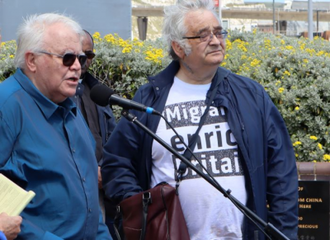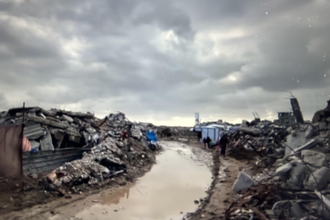Update on Migrants from Seeking Sanctuary

Phil Kertton and Ben Bano at the Migrants Memorial in Dover
Modern Slavery
As we sent out our previous Update from Seeking Sanctuary, the Home Secretary again claimed that 'modern slavery laws are being abused by people gaming the system' - a follow-up to her previous claims that protections are being manipulated by small boat arrivals. The Office for Statistics Regulation said that it had requested 'specific evidence' for her claims but none had been provided.
It is true that the proportion of referrals deemed to be genuine cases of modern slavery in Home Office 'conclusive grounds decisions' has risen year by year from 58 per cent in 2016 to 91 per cent in 2021. However, this surely reflects the results of a government strategy encouraging Border Force officers, police and other officials to get better at identifying potential victims. Ministers and officials have still not produced evidence to support the rhetoric, and there is concern is that this style of rant severely undermines the protections of the Modern Slavery Act of 2015.
In and Around Calais
Arctic weather can settle in the area when gale force winds come down the North Sea or up the Channel. The usual harsh living conditions and struggle to survive become even harder. Associations working on the ground have reported that there are more young people in the camps, in particular Afghans in one of them. There is particular pressure with increases from new communities from the Near East (North Africa, Iran, Syria and Egypt with young people under 15), including a large majority of young boys.
A project in Calais provides legal, social and psychological support to unaccompanied minors to strengthen their access to rights. It's review of 2022 reports that it helped 320 minors on the streets, 27% of them aged 15 or less. 47% came from Sudan, 13% from Afghanistan and 10% from Syria. Only 21 had been recognised as unaccompanied minors by child protection services and received long-term care. The average time spent on the streets was 77 days. Instances of psychological suffering were observed: post-traumatic stress with hypervigilance; depressive symptoms with insomnia and nightmares; destructive behaviours, such as eating disorders.
The political strategy of avoiding 'fixation points' has led to daily evictions in the area, mainly in daylight. This involves displaced people being forced to move their tents and belongings, anywhere from two to 500 meters. Personal belongings and basic necessities (such as tents, blankets, bags, identity papers, mobile phones, medicines, clothes, etc.) are often taken and/or destroyed on the spot and/or thrown into the skip, without giving their owners any opportunity retrieve them. These acts are unlawful and yet take place in front of the bailiffs in charge of evictions. These operations of harassment are also often accompanied by abusive identity checks, followed by arbitrary arrests and illegal periods in administrative detention.
Deaths
Four more people drowned in the Channel in mid-December, as they risked everything to reach the UK. Over 30 others survived after clambering out of a twisted black dinghy in freezing temperatures. Witnesses said that the survivors came from Afghanistan and Iraq - two countries from which millions of people continue to flee because of war and persecution.
Our deepest sympathies are with their loved ones and all those directly affected by this tragedy. No one risks their own, or their family's life, unless they are running from dangers more acute than those they face on these dangerous journeys.
UK government data show that two-thirds of the men, women and children arriving this way are from countries where war and persecution have forced them from their homes. Yet almost no safe routes for refugees to get to the UK exist, even from these places, even from countries like Afghanistan, Syria and Iran. The only option to make an application for asylum is take a dangerous journey. The evidence is clear - using ever more Draconian policies to try to 'deter' people who have had to flee for their lives doesn't work. We continue to call for compassionate and well-thought through plans that will save lives and give protection to those who need it.
2023 has started with more horrific news of a death. Calais is crossed by a number of railway lines placed at ground level among the streets and business areas. On 3 January, Fouad Dango, aged 29 and from Sudan, walked in front of a train travelling on one of the tracks close to the Rue de Judée, where food and water are distributed to the exiles. He has been buried in the town's cemetery.
A huge thank you from Napier Friends
Napier Friends - the group which supports people held in Napier Barracks in Folkestone, would like to pass on their thanks for generous festive donations of £850 which have enabled hats and scarves to be purchased for residents as well as for 85 people who were moved to local hotels in Folkestone. These were very much needed and appreciated during the recent cold weather.
Detention
The often very visible arrival of more people in small boats, and a large and growing backlog in the asylum system, suggest that the UK's immigration system is in crisis. The government therefore says that it intends to reassert control over the borders through measures that include the expanded use of immigration detention.
Some recourse to detention may be justified if it ensures that those with no right to remain do not avoid immigration control. However, as 2022 drew to a close, it became evident that thousands of people were held in unhealthy conditions for long periods in the processing facility at Manston in Kent. At one point around 4,000 people were being held at a site designed for 1,600 and outbreaks of diphtheria and scabies were reported, not to mention Covid. Not only were there risks to the individuals concerned, some of whom resorted to self-harm and attempts at suicide, but our international reputation for fair treatment and taking responsibility for the welfare of people in government care has surely been damaged.
Safeguarding is particularly important for immigration detainees, who generally lose the protections of citizenship, and may have a history of trauma or be prevented by linguistic or cultural barriers from explaining their circumstances or asserting their rights. For many years regular inspections and reviews have taken place to ensure that policies to protect vulnerable people do work as they should. The Home Office has invested time and energy to improve policies and procedure, with teams to put the findings of inspections and reviews into practice. But those responsible have noted that although many recommendations are accepted, progress in implementing them has been painfully slow.
Continued Persecution
The state policy of applying bullying and hindrance to aid workers is still active. On the morning of 19 January the team from the Calais Food Collective found that their tank used to distribute drinking water had disappeared and that rocks had been deposited to prevent its replacement. The two local police forces deny responsibility, despite having been spotted in very similar actions in the past.
In September, the Calais municipality, under pressure from reporters, admitted that a tank had been seized and in the following month a court in Lille found that official notices banning the distribution of food and water were illegal. Nevertheless, the obstructive actions continue and the French State is preparing to appeal the court decision.
A statement from the Collective called for a halt, saying that freezing conditions put more lives at risk and increased the need for food and water to be provided. They pointed out that all human life is sacred and promised that they will never stop protesting again these inhuman actions.
Intolerance and Pushback in Europe
News reaches us of disturbing developments as the far right takes power across several European countries. In Italy landings of rescued people have been banned and NGO boats have been forced to take much longer journeys to French ports. NGO operations have also ceased in Lesbos following charges laid against rescuers relating to assistance given to people fleeing Syria in 2015/2016.
Sweden, for so long a bastion of liberalism, is now being influenced by far right politicians who exercise much influence in Swedish politics. The earlier policies of 'burden sharing' has not been implemented, resulting in increasing 'pushbacks', particularly in Romania, Croatia and Hungary. And Austria, long a crossroads of different nationalities, has called for a Rwanda style deportation plan.
The reasons for all this are obvious - food and climate insecurity, inequality and rapid demographic changes, as well as war and violence, are just some of the causes. And humanitarian policies take a back seat in the face of the rise of the far right.
'Faith and Frontiers'
This is the title of a free online conference on Saturday 18 February from 10am to 4pm, looking at Christian responses to the migration crisis. It is promoted by 'Project Bonhoeffer', a charity established to promote the legacy of this well-known peacemaker who lost his life in 1945.
The keynote address will be given by Bishop Rose Hudson-Wilkin, Bishop of Dover, and other speakers include Dr Ulrich Schmiedel of the University of Edinburgh, an authority on religion and migration, and Rev Dr Keith Clements, a noted Bonhoeffer scholar, who will be joined by people from groups currently working to meet the needs of asylum seekers in Calais, Kent and the North of England.
The Project, set up in 2011, aims to inform and remind today's Christians of the challenges of discipleship that Dietrich Bonhoeffer addressed in his radical theology and in the Christian witness that led to his execution by the Nazis at the end of the Second World War.
The project's events seek to enable people to put Christian faith into action in ways that make a positive difference in the world, engaging with the key social and political challenges we face. It encourages and resources theological reflection, conversation and community-building around Bonhoeffer's work and life and its implications for today. The goal is not unlike that of the well-worn Pastoral Cycle, providing opportunities for people to think and to act - reflecting on faith … and then doing something about it in the context in which they live and feel called to serve.


















